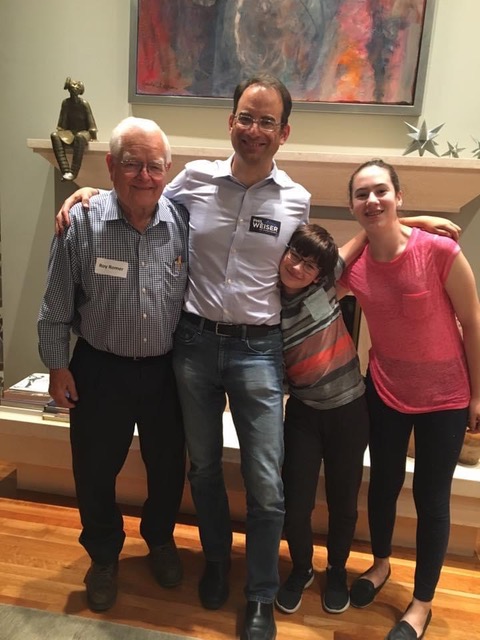Too often, our government is viewed as distant, uncaring, and unresponsive. Authentic engagement guided Governor Romer’s career of service. As Governor, he took his leadership team across our great state, calling it “Dome on the Range.” This work, he explained to me, grounded him and his team. Following this model, I took my leadership team on a retreat after we took office, going to the San Luis Valley to develop our core values and commitment to service. And I have made a practice of visiting communities across our entire State, meeting people in every county multiple times, holding town hall meetings, and visiting with people on what matters to them and their communities.

I’m so humbled and grateful that Governor Roy Romer is the Honorary Chair of my campaign to serve as Colorado’s next Governor. Not only because he is a mentor and someone who is a true Colorado public servant, but because he sets a standard for authentic engagement, fighting for freedom and equality, and making government work.
One of the best examples of his engagement and leadership was how Governor Romer helped build Denver International Airport. When Adams County was considering whether to support its land being used for the airport, Roy Romer took to what he called “the oatmeal circuit.” He, quite literally, ate oatmeal at every diner in Adams County—sometimes three breakfasts in a single day. He spoke to and listened to the people there, asking questions like “what are you hearing about the airport” and listening to their concerns and ideas. After the measure passed, Romer was credited for helping to persuade Coloradans to approve the airport project.
Following Governor Romer’s lead, I travelled across our State and held 19 town halls, to hear from the people of Colorado on whether to challenge the Kroger/Albertsons merger. Those conversations—where I heard how this proposed merger would hurt workers’ jobs, harm farmers and local food producers, and drive up the price of groceries for Colorado families–guided my decision to go to court to stop it.
Another lesson I learned from Governor Romer is how we can listen to others and respect them, even those we disagree with. He did not believe in demonizing others; rather, he called for a level of listening and humility that guides my approach to public service. I once described this by saying:
In today’s hyper-polarized environment, there is too little listening and too little collaborative problem-solving in our politics. A virus that prevents collaboration—and creative problem solving—is that people are often more interested in winning an argument than solving a problem. Or put differently, it is possible that two people can both be right—looking at different sides of an issue where both see part of the truth—and yet neither individual is able to see what the other is seeing.
Romer was also a powerful champion of freedom and equal rights for all. As Governor, he was an ardent critic of Amendment 2, a ballot proposition to restrict civil rights for LGBTQ individuals and served as the honorary chairman on the campaign opposing the measure. At the time, he was praised for recognizing—well before others did—that LGBTQ individuals deserve the same rights and protections of our government. As Colorado’s Attorney General, I have fought for equal rights for the LGBTQ community and for all Coloradans, including supporting the effort to remove the ban on same sex marriage in Colorado’s Constitution. Before Colorado’s Constitution was amended to ban same sex marriage, Governor Romer vetoed a similar bill in the legislature, calling it a “mean-spirited and unnecessary” attempt “to single out and condemn the lifestyle of gay and lesbian people.”
Governor Romer also understood that a healthy Colorado economy was the foundation for everything else. When he was first elected, Colorado was still reeling from an economic crisis. As Governor, he pushed for good jobs and economic opportunities throughout our State. He reached out to the labor and business communities, and to those of all political stripes—Republicans, Democrats, and Independents alike. . While not everyone around the table always agreed, people always felt that Romer listened to them. As noted above, Governor Romer’s belief that “all truth is partial” meant that he was always interested in what people had to say—and people felt that.
As AG and when teaching at CU, I focused on supporting new small businesses and people trying to start up new businesses to create jobs. And one of my top priorities as AG was to protect our marketplace from fraudulent businesses that act illegally, so consumers aren’t taken advantage of and so good and responsible businesses can succeed. In all my work, I have honored Governor Romer’s commitment to listening—and always ensuring that we have an open dialogue, recognizing that we might well be missing part of the truth.
Finally, Romer set aside political considerations when it came to doing what was right. Famously, in the face of a teachers strike, he intervened as a mediator and settled the strike, not because he had any formal role in the matter, but because he cared about the affected students were owed that result. As Bobby Kennedy famously said, some see the world as it is and ask why; others see the world as it should be and ask “why not?”
* * *
We live in a time of declining faith in government and our institutions. But there’s reason for hope. If we follow Governor Romer’s example, his commitment to transparency, his dedication to listening (particularly those who see things differently), and his commitment to solving problems that affect people’s daily lives, we will get there.